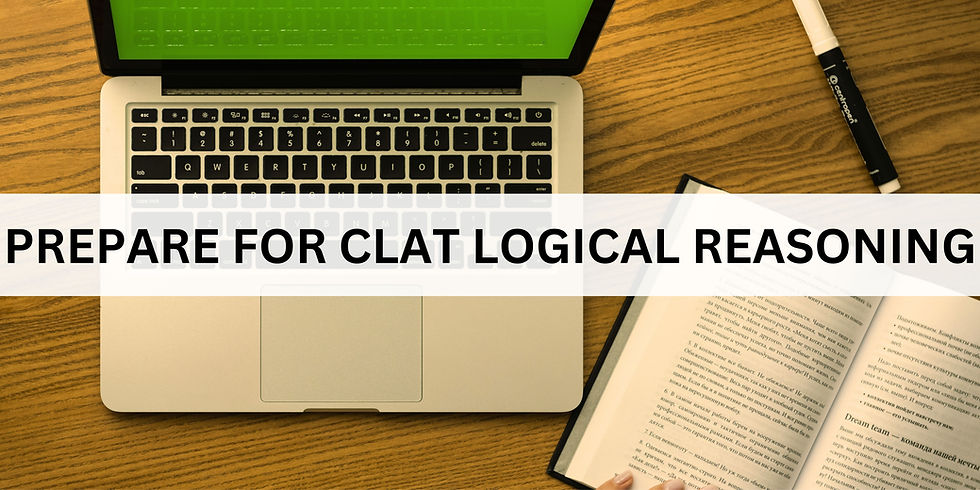Understanding CLAT and the Importance of Logical Reasoning
- Yukta Sharma
- Jul 20, 2024
- 3 min read

The Common Law Admission Test (CLAT) is a centralized national-level entrance examination for admissions to undergraduate (UG) and postgraduate (PG) law programs offered by 22 National Law Universities (NLUs) in India. In addition to the NLUs, various affiliated law colleges and universities across India use CLAT as an admission test for their law programs.
Now let's understand What is CLAT & How to Prepare for It:
CLAT is one of the most competitive exams in India, with thousands of aspirants appearing each year to secure a seat in prestigious law schools.
CLAT Exam Structure
The CLAT exam is divided into five sections:
English Language: This section tests the candidate’s proficiency in English, focusing on comprehension, grammar, and vocabulary.
Current Affairs, including General Knowledge: This section assesses the candidate’s awareness of current events and general knowledge, including history, geography, and basic sciences.
Legal Reasoning: This section evaluates the candidate’s understanding of legal principles and their application to given situations.
Logical Reasoning: This section measures the candidate’s ability to identify patterns, and logical links, and rectify illogical arguments.
Quantitative Techniques (Mathematics): This section tests basic mathematical abilities, including arithmetic, algebra, and data interpretation.
Importance of Logical Reasoning in CLAT
The Logical Reasoning section is a crucial component of the CLAT exam. It is designed to test the candidate's ability to think logically and critically, which is essential for a career in law. Here’s why the Logical Reasoning section matters:
Analytical Skills: Logical reasoning evaluates the ability to analyze arguments and identify patterns. These skills are fundamental in breaking down complex legal arguments and understanding their structure.
Problem-Solving Skills: This section tests the candidate’s ability to solve problems and puzzles. Problem-solving skills are vital in law, where lawyers frequently encounter complex issues that require logical and creative solutions.
Decision-Making: Logical reasoning helps assess the candidate’s decision-making abilities, which are crucial for making sound legal judgments.
Understanding of Arguments: This section tests a candidate’s ability to understand and analyze the structure and components of arguments, which is essential for constructing and deconstructing legal arguments.
Types of Questions in Logical Reasoning
Logical Puzzles: These include arrangement puzzles, sequences, and other similar problems that require logical deduction. Candidates may be asked to arrange items based on given conditions or to find the sequence in a pattern.
Syllogisms: Questions involving logical relationships and conclusions based on given premises. Candidates need to determine whether a conclusion logically follows from the given statements.
Analogies: Identifying relationships between pairs of concepts or objects. These questions test the ability to discern similarities and differences between related items.
Critical Reasoning: CLAT Logical Reasoning questions test the ability to evaluate arguments, identify assumptions, and assess the strength of conclusions. Critical reasoning is essential in law, where evaluating the strength and validity of arguments is a daily task.
Inference and Conclusion: Questions that require deriving conclusions from given statements or passages. This type of question tests the candidate's ability to read between the lines and understand implicit information.
Preparation Tips for Logical Reasoning
Practice Regularly: Regular practice is essential for mastering logical reasoning. Solving a variety of logical reasoning questions helps in understanding different patterns and improving speed and accuracy.
Understand the Basics: Grasping fundamental concepts like logical connectors, conditional statements, and the structure of arguments is essential. A solid foundation in these basics will help tackle more complex problems.
Time Management: Practicing under timed conditions helps improve the ability to answer questions quickly and accurately. Time management is crucial in the CLAT exam, where every second counts.
Mock Tests: Taking mock tests helps in familiarizing oneself with the exam format and identifying areas that need improvement. Mock tests also help in building test-taking stamina and managing exam stress.
Analyze Mistakes: Reviewing errors to understand where you went wrong and how to avoid similar mistakes in the future is critical. Learning from mistakes helps in refining strategies and improving performance.
Use Logical Reasoning Books and Online Resources: There are numerous books and online resources available that provide practice questions, explanations, and strategies for logical reasoning. Utilizing these resources can provide additional practice and insights.
Focus on Weak Areas: Identify weak areas and dedicate extra time to improving them. Consistent effort in areas of difficulty will yield better results.
Conclusion
The Logical Reasoning section is a vital part of the CLAT exam and plays a significant role in determining a candidate's overall score and rank. Strong preparation in this section can greatly enhance the chances of securing admission to a top law school. Developing analytical skills, problem-solving abilities, and critical thinking through regular practice and strategic preparation is essential for success in the Logical Reasoning section of CLAT.



Comments